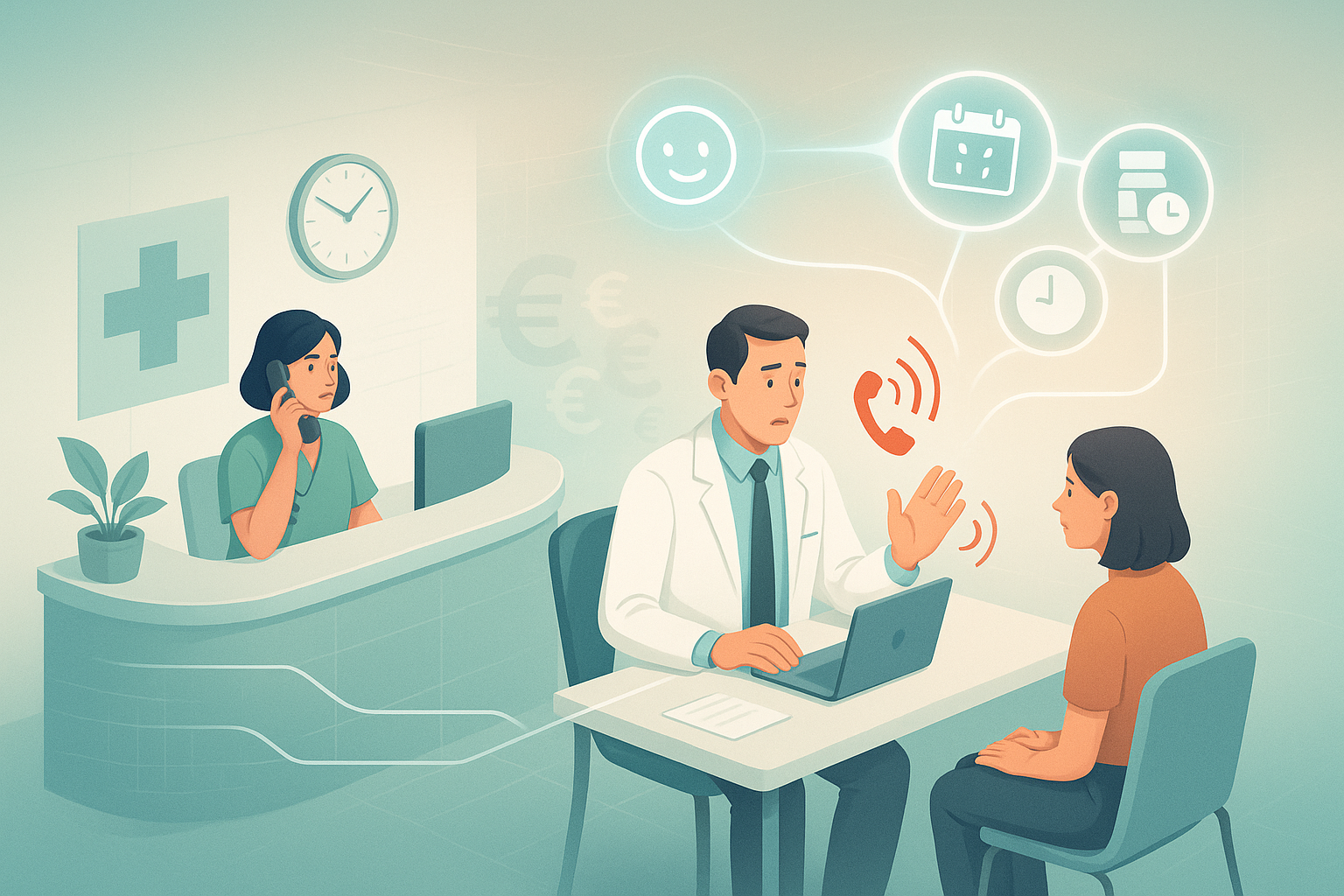How Medical Practices Lose 20+ Hours Weekly to Admin Tasks

The Administrative Avalanche: How Medical Practices Lose 20+ Hours Weekly to Routine Inquiries
10 AM on a Tuesday. Dr. Smith, a specialist in chronic condition management, begins a vital patient consultation. Just as she gains clinical momentum, the phone rings. “What time is my appointment next week?” The question halts her progress. A seemingly small interruption eats into 5 valuable minutes of her day. This scene repeats 40 times across her practice daily, amounting to more than 20 hours wasted every week.
This story is far too familiar. Across Europe, medical professionals trained to save lives and ensure patient health are reduced to fielding basic administrative tasks. For practices juggling multilingual patient bases, stringent GDPR requirements, and the pressing need for exceptional patient care, administrative inefficiencies threaten not just their workflow—but their very future.
The Medical Staff Interruption Crisis
The Daily Reality for Medical Practices
Every day, the average practice receives 60–100 routine patient calls. From appointment queries to prescription refills, these inquiries disrupt clinical workflows. Medical staff are interrupted every 15–20 minutes, compromising the quality of patient consultations. Instead of focusing on diagnostics or treatments, qualified professionals are burdened with administrative inquiries that require no medical expertise.
What's Really at Stake?
- Patient Care Quality Declines
Administrative interruptions reduce consultation focus, delay treatments, and leave patients dissatisfied with rushed visits.
- Staff Burnout and Retention Issues
Medical professionals are forced into roles they weren’t hired for, decreasing job satisfaction and increasing employee turnover.
- Revenue Losses
Practices reduce their capacity for appointments, delay procedures, and incur additional costs to manage these inefficiencies.
- Competitive Disadvantage
Larger or tech-savvy practices with efficient systems easily capture dissatisfied patients from traditional clinics.
The Hidden Cost of Administrative Tasks in Healthcare
Looking closely, the time lost to these tasks paints a stark picture.
Medical Staff Time Analysis
- Routine Call Duration: 6–10 minutes per call (includes documenting interactions and system updates).
- Time Lost per Day: 3–4 hours of clinical time per professional.
- Weekly Impact: More than 20 hours of expertise wasted.
- Annual Total: Over 1,000 hours lost per practice.
Ripple Effects on Patient Care
Interrupted Consultations
Doctors lose focus and clinical momentum, lowering the quality of assessments and treatment planning.
Delayed Procedures
Administrative bottlenecks push crucial diagnostic and therapeutic procedures further down the priority list.
Reduced Education Time
Patients miss the opportunity to fully understand their conditions and treatment plans.
Operational and Financial Consequences
- Patient wait times increase, leading to dissatisfaction.
- Practices face decreased productivity as staff juggle conflicting priorities.
- Overtime costs rise when medical tasks are completed after hours.
Long-term Challenges to Sustainability
Inefficient practices are vulnerable to competitive pressures. From integration delays to GDPR complexities, these inefficiencies trickle down into financial instability and hinder growth opportunities.
The Modern Patient vs. Medical Practice Realities
Today’s patients have high expectations for how practices communicate and deliver care.
What Patients Want
- Immediate Access
Patients expect real-time appointment scheduling, office information, and answers to common queries.
- 24/7 Support
Accessible solutions for non-urgent questions outside business hours are a must.
- Multilingual Assistance
With diverse European populations, patients need support in multiple languages.
Current Gaps in Practices
- Interrupted Workflows
Important medical evaluations take a backseat to non-urgent communications.
- Lack of Automation
Patients cannot easily access answers without staff involvement.
- Language Barriers
Multilingual patients experience communication breakdowns when practices lack adequate support systems.
The Real Costs of These Gaps
The irony of the healthcare paradox is striking. While patients pay to receive medical expertise, they end up battling inefficiencies caused by outdated systems and overwhelmed staff.
How VELENTIS Can Transform Your Practice
Here’s where VELENTIS steps in—not just to address inefficiencies but to revolutionize how medical practices operate.
Intelligent Patient Communication
Say goodbye to non-urgent call interruptions. With VELENTIS:
- Automated Appointment Tools
Patients can schedule, reschedule, or confirm appointments 24/7.
- Routine Inquiry Resolution
Office hours, pre-care instructions, and services offered are easily accessible.
- Prescription Assistance
Prescription refill requests and updates never need to interrupt clinical workflows again.
GDPR-Compliant Automation
VELENTIS ensures all patient data is handled securely, adhering to European healthcare regulations.
- Audit-Trail Documentation
A complete log of interactions ensures compliance and accountability.
- Secure Patient Authentication
Robust verification ensures sensitive medical information stays secure.
Multilingual Support for European Practices
Communicate effectively with diverse patient bases:
- Native-level support across multiple languages, including German, French, Spanish, Italian and 40+ more.
- Accurate medical terminology ensures patient understanding and satisfaction.
Seamless Medical Integration
VELENTIS synchronizes with key practice management systems like EMR to:
- Provide consistent patient records.
- Deliver real-time notifications for urgent matters.
- Maintain smooth workflows for staff.
Measuring VELENTIS's Impact
With VELENTIS solutions, practices recover 20+ hours weekly for patient care, improve staff satisfaction, and enhance patient experiences through seamless communication systems.
Why Your Practice Can’t Afford to Wait
Imagine what your practice could achieve with 20+ hours of clinical time restored every week. Enhanced patient care. Happier staff. Greater profits. While the need for administrative efficiency in European practices is urgent, tools like VELENTIS make achieving it effortless.
Take the first step toward improvement and boost your practice's efficiency. Discover how VELENTIS can save you time by helping your staff focus on what matters most—patients.
VELENTIS Team
Automation experts at VELENTIS
